List of former mosques in Greece
This is a list of former mosques in Greece. It lists former mosques (Arabic: مَسْجِد, romanized: masjid, Greek: Τζαμί, romanized: tzamí, Turkish: Camii) and places of worship for Muslims in Greece. It lists some but by no means all of the old historical mosques of Greece. The term former mosque in this list includes any Muslim mosque (building) or site used for Islamic Prayer (Salah) in Greece but is not so any longer. For currently open, functioning mosques in Greece see List of mosques in Greece.
Mosques have existed within the borders of modern Greece since the era of Emirate of Crete (824-961). But no mosques of the Emirate remain as they were torn down and remaining Muslims either killed, enslaved or converted to Christianity after the Byzantine reconquest of Crete (961).[1][2] Therefore currently the oldest mosque in Greece and the entire Balkan peninsula is believed to be the Çelebi Sultan Mehmed Mosque, the first in Didymoteicho (Western Thrace) built between 1389-1402.[3]
Most of the listed former mosques date from the late 14th century to the early 20th century, when various parts of modern Greece was at some point a part of the Ottoman Empire.[3]
Many Ottoman mosques and the other Muslim monuments, especially in southern Greece, were either destroyed during the Greek War of Independence in the 1820s and successive wars and conflicts. During periods of nationalist uprising and wars against the Ottoman and later the Turkish army, the newly independent Greek nation showed little respect for the monuments of a faith identified with the enemy.[3] A number of Ottoman mosques were confiscated and repurposed for use as government offices, churches, and other civilian purposes.
Many more mosques in Greece were closed or abandoned due to the 1923 Population exchange between Greece and Turkey. As a result, 355,000 to 400,000 Muslims left Greece,[4] most of them forcibly made to leave their lands, livelihoods, and mosques.
Many former mosques and other religious buildings also survived in the provinces of Macedonia, Thrace, Crete, and the islands of the Dodecanese which were integrated into the Greek State in the early 20th century. By then there was already a law for the protection of religious buildings of all faiths.[3]
The surviving former mosques or other religious structures are nowadays protected as monuments.[3] A number of them are still used as government buildings and churches, while many others have been restored and used as museums, exhibition, and concerts centers and as tourist attractions.[3]
List of former mosques in Attica
List of former mosques in Attica administrative region in Central Greece that encompasses the entire metropolitan area of Athens.
| Current Name | Mosque Name | Images | City | Year Opened | Year Closed | Notes | Ref. |
|---|---|---|---|---|---|---|---|
| Fethiye Mosque Museum | Fethiye Mosque (English:Mosque of the Conquest, Greek: Φετιχιέ τζαμί, Turkish: Fethiye Camii), Wheat Market Mosque | 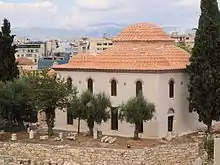 |
Athens | 15th Century | 1830 | One of the most important monuments from Ottoman Greece period still existing in Athens. Reportedly mosque first opened in 15th century on ruins of a Byzantine Christian basilica. Current mosque built in 1668-1670. Mosque was repurposed after 1834 Greek independence and fell into disrepair. Renovated and open to public for cultural exhibitions since 2017. | ,[5][6] |
| Annexe of Museum of Greek Folk Art | Tzistarakis Mosque (Turkish: Cizderiye Camii), 'Mosque of the Lower Fountain’ | 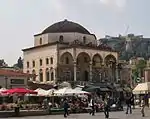 |
Athens | 1759 | 1830 | Mosque built by Mustafa Agha Tzisdarakis, the Ottoman governor or commander of Athens Fortress in the heart of town market in Monastiraki Square. After Greece's independence in 1830, mosque was used for various purposes. The state restored it in 1918 and using it as a museum. | ,[5][6] |
List of former mosques in Central Macedonia
List of former mosques in Central Macedonia administrative region.
| Current Name | Mosque Name | Images | City | Year Opened | Year Closed | Notes | Ref. |
|---|---|---|---|---|---|---|---|
| Mehmet Bey Mosque (Greek: Τέμενος Μεχμέτ Μπέη) | 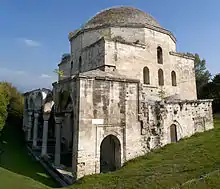 |
Serres | 1492-1493 | Built by Mehmed Bey, son of the grand vizier Gedik Ahmed Pasha in 1492-1493. The mosque and mausoleum of İsmail Bey was left abandoned after the Greek-Turkish population exchange. | [7] | ||
List of former mosques in Western Greece
List of former mosques in Western Greece administrative region.
| Current Name | Mosque Name | Images | City | Year Opened | Year Closed | Notes | Ref. |
|---|---|---|---|---|---|---|---|
| Fethiye Mosque (Nafpaktos) | 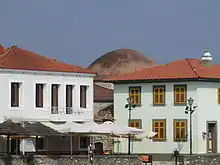 |
Nafpaktos | 1499 | Situated on the waterfront near the eastern side of the port. Built by Ottoman Sultan Beyazid II shortly after the capture of Nafpaktos from the Venetians. Open only for occasional temporary exhibitions. | [8] | ||
| Vouleftikon (English:Parliament) | Aga Pasha Mosque | 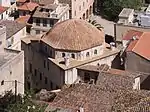 |
Nafplio | 1730 | Mosque built as a gray stone building off the Nafplion Syntagma Square. After Greek take over, it housed the first Greek People's Assembly, which met here for the first time in 1825 and later even as a prison. It's now fully restored but open to the public only for concerts in the former main hall of the mosque. Connected to the mosque in the back is the Medrese (English: Madrasa) building which used to be a Turkish Islamic religious school. | [9] | |
List of former mosques in Crete
List of former mosques in Crete, the largest and most populous of the Greek islands.
| Current Name | Mosque Name | Images | City | Year Opened | Year Closed | Notes | Ref. |
|---|---|---|---|---|---|---|---|
| Kucuk Hasan Pasha Mosque | English: Mosque of the Janissaries, Greek: Gialisi Tzami, Turkish: Küçük Hasan Pasha Camii | 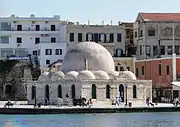 |
Chania | 1645 | Best preserved former mosque in Chania city. Built by Ottomans honoring Kucuk Hasan Pasha. Presumed to be built on a preexisting Christian temple. The mosque has a large semispherical dome supported by stone arches. The north and west sides house a gallery that is crowned by six small domes. The gallery used to be open, as used in the mosques but was enclosed with arched openings in the late 19th century. | [10] | |
List of former mosques in the Aegean Islands
List of former mosques located in the Aegean Islands, the group of islands in the Aegean Sea between mainland Greece and Turkey.
| Current Name | Mosque Name | Images | City | Year Opened | Year Closed | Notes | Ref. |
|---|---|---|---|---|---|---|---|
| Lesvos Valide Mosque | (Greek: Βαλιντέ Τζαμί) | 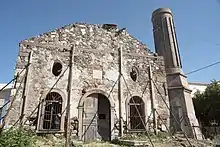 |
Mytilene | 1615 | Located in Epano Skala which was a predominantly Turkish section within the port city of Mytilene, the capital of Lesvos Island. The mosque is a stone-built, one-story building with a marble staircase. Features a stone-paved front yard with a fountain embellished with engraved arabesques. The interior roof of the mosque used to be colorfully painted but the roof was painted brown after the Turks left the city. | [11] | |
List of former mosques in Epirus
List of former mosques in Epirus (region) in northwestern Greece.
| Current Name | Mosque Name | Images | City | Year Opened | Year Closed | Notes | Ref. |
|---|---|---|---|---|---|---|---|
| Aslan Pasha Mosque - Municipal Museum | Aslan Pasha Mosque, Greek: τζαμί Ασλάν Πασά) | 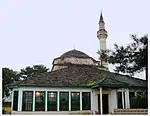 |
Ioannina | 1618 | The core of a large Islamic religious-educational complex. Only the mosque, Mendreses (Seminary), Homonym Tourbes (mausoleum), and Mageiria (hearth and home) survive today. Mosque interior is preserved with beautiful Minbar (pulpit) and Mihrab (prayer niche). The museum collection includes artifacts from the era of Ali Pasha, bronze objects, and Islamic books. | [12] | |
List of former mosques in Thessaly
List of former mosques in Thessaly administrative region near central Greece. The region was under the Ottoman controls for four and a half centuries, until 1881. As such many former mosques still remain intact.
| Current Name | Mosque Name | Images | City | Year Opened | Year Closed | Notes | Ref. |
|---|---|---|---|---|---|---|---|
| Osman Shah Mosque | 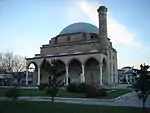 | Trikala | 1550s | The mosque is no longer used for worship; it now functions as a venue for minor events and is a protected UNESCO site. | |||
| Yeni Mosque | 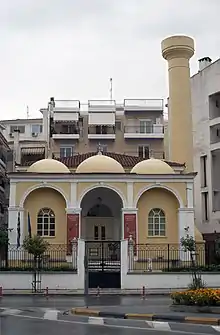 | Larissa | 1902 | It was used to house the Archaeological Museum of Thessaloniki in 1925. Today it serves as an exhibition center. | |||
| Alaca Imaret Mosque | .JPG.webp) | Thessaloniki | 1484 or 1487 | Today the building is being used for temporary exhibitions, artistic and cultural events.[13] | |||
| Hamza Bey Mosque | 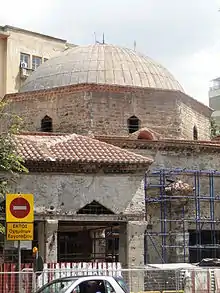 | Thessaloniki | 15th century | Since 1923, the minaret was removed and the building no longer functioned as a mosque. It was taken over by the Greek Ministry of Culture in 2006. | |||
| Muharrem Pasha Mosque | 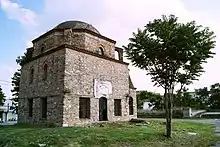 | Elassona | 17th/18th century | For some time, the building was used to store parts of the Elassona archaeological collection. | |||
See also
References
- Canard (1971), pp. 1084–1085
- Kazhdan (1991), p. 96
- "Old and new mosques in Greece:a new debate haunted by history". academia.edu. Retrieved 19 September 2020.
- Giuseppe Motta (2013). Less than Nations: Central-Eastern European Minorities after WWI. 1. Cambridge Scholars Publishing. p. 365. ISBN 9781443854610.
- "Restored Fethiye Mosque opens to visitors in Athens". lonelyplanet.com. Retrieved 17 September 2020.
- "Historic Ottoman mosques cast light on Greek capital Athens". dailysabah.com. Retrieved 17 September 2020.
- "Mehmed Bey Mosque". ottoman.mfa.gov.tr. Retrieved 17 September 2020.
- "Fethiye Mosque (Nafpaktos)". lonelyplanet.com. Retrieved 18 September 2020.
- "A parliament, a recidence and a mosque". visitnafplio.com. Retrieved 18 September 2020.
- "About Kucuk Hasan Pasha Mosque". hellotravel.com. Retrieved 19 September 2020.
- "Lesvos Valide Mosque". greeka.com. Retrieved 19 September 2020.
- "Aslan Pasha Mosque - Municipal Museum". travelioannina.com. Retrieved 19 September 2020.
- Page 196, Memory and Architecture, Eleni Bastéa,(Albuquerque: University of New Mexico Press, 2004).
Sources
- Canard, M. (1971). "Iḳrīṭis̲h̲". In Lewis, B.; Ménage, V. L.; Pellat, Ch. & Schacht, J. (eds.). The Encyclopaedia of Islam, New Edition, Volume III: H–Iram. Leiden: E. J. Brill. pp. 1082–1086. OCLC 495469525.
- Kazhdan, Alexander (1991). "Anemas". In Kazhdan, Alexander (ed.). The Oxford Dictionary of Byzantium. Oxford and New York: Oxford University Press. p. 96. ISBN 0-19-504652-8.